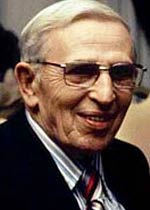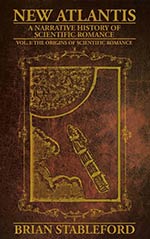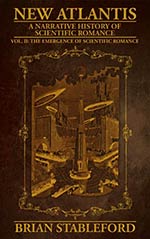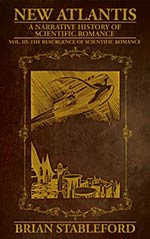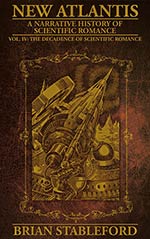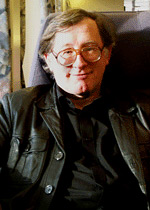Judith Merril’s Take On Classic Science Fiction
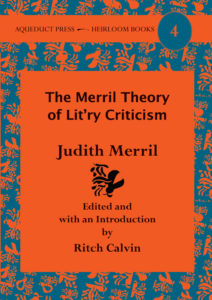 I have to thank Aqueduct Press (“Bringing Challenging Feminist Science Fiction to the Demanding Reader”) for publishing The Merril Theory of Lit’ry Criticism by Judith Merril. If you have sufficient years reading science fiction you’ll remember the annual SF collections of best short stories Judith Merril edited back in the 1950s and 1960s. What Ritch Calvin has done is collect all her introductions and summaries from those 1956-1969 annual anthologies, 38 book review columns from The Magazine of Fantasy and Science Fiction (1965-1969), and a few additional essays from Extrapolation, a journal devoted to studying science fiction. For ebook readers, he also includes the introductions to all the short stories from all the anthologies. That’s 622 pages (ebook) or 360 pages (paperback) of commentary on science fiction, a goldmine of insight into old science fiction. Both editions are available from Amazon or the publisher, and hopefully your local bookstore.
I have to thank Aqueduct Press (“Bringing Challenging Feminist Science Fiction to the Demanding Reader”) for publishing The Merril Theory of Lit’ry Criticism by Judith Merril. If you have sufficient years reading science fiction you’ll remember the annual SF collections of best short stories Judith Merril edited back in the 1950s and 1960s. What Ritch Calvin has done is collect all her introductions and summaries from those 1956-1969 annual anthologies, 38 book review columns from The Magazine of Fantasy and Science Fiction (1965-1969), and a few additional essays from Extrapolation, a journal devoted to studying science fiction. For ebook readers, he also includes the introductions to all the short stories from all the anthologies. That’s 622 pages (ebook) or 360 pages (paperback) of commentary on science fiction, a goldmine of insight into old science fiction. Both editions are available from Amazon or the publisher, and hopefully your local bookstore.
Judith Merril was an exceptionally well-read reviewer, not only referencing a detailed knowledge science fiction and its history, but literary works and science books. She was also pithy, funny and to the point. Here’s her 1965 review of PKD’s latest, where at the end of a previous book review had stated, “Philip Dick did it better three years ago, in The Man in the High Castle.” She then continues…
The Three Stigmata of Palmer Eldritch, Philip K. Dick, Doubleday, $4.95, 278 pp.
I don’t mean, this time, that his new book is similar in theme or treatment. Rather, that I wish it were more so, at least in characterizations and structure. Phil Dick is, one might say, the best writer s-f has produced, on every third Tuesday. In between times, he ranges wildly from unforgivable carelessness to craftsman-like high competence. In the case of Palmer Eldritch, I would guess he did his thinking on those odd Tuesdays, or rather on one of them, and the actual writing in every possible minute before another Good Tuesday came on him. Here is a riotous profusion of ideas, enough for a dozen novels, or one really good one; but the stuff is unsorted, frequently incompleted, seldom even clearly stated. The style is alternately dream-slow-surreal and fast-action-pulp. Thematically, he at least approaches, and sometimes stops to consider, virtually every current crucial issue: drug addiction, sexual mores, over-population, the economic structure of society, the nature of the religious experience, parapsychology, the evolution of man — you name it, you’ll find it. The book, with all this, is inevitably colorful, provocative, and (frustratingly) readable. I wish I thought it possible that Dick might some time go back to this one, publication notwithstanding, and finish writing it.
One reason why I immediately hit the buy button for The Merril Theory of Lit’ry Criticism is because I bought her anthologies a half-century ago, and started reading F&SF around that time too. For years now I’ve been meaning to order those anthologies used from ABEBooks, just so I could read the commentaries. To have Calvin throw in all the book reviews was too good to be true, but it is.
I’ve been hung up on my science fictional past, and this book is perfect for retracing steps I first took in 1965. Anyone who collects old SF from that era will find this volume to be a treasure chest of clues.
Merril, on occasion, had a lot to say about a book. She often read a book more than once to write a review. She was determined to understand science fiction at a level beyond what most readers ever try. Look at this review of Nova by Samuel R. Delany, one the more memorably SF books from the 1960s. I probably read this review at the time too. This is a great example of what Merril does when she goes long:
Leave your preconceptions behind, again, when you open Samuel Delany’s new Nova (Doubleday, $4.95). My own problem was the opposite of my friend’s with 2001: I came to this book with an anticipation keener than any I have brought to anything since — well, probably Vonnegut’s Rosewater — looking for (at least an approach to) the Great Novel I (still) expect from the author of Empire Star, Babel-17, The Einstein Intersection, “The Star-Pit,” “Aye and Gomorrah,” and (now) Nova: and what I got instead was a first-rate jim-dandy solid provocative science-fiction novel.
It took me a while to realize I had no honest cause for complaint — a while longer to discover I damn well did have cause — longer yet to understand (first) why I was so irritated, and (eventually) the real reasons to be annoyed with the book.
Delany is in an almost unique position in s-f today: everybody loves him. The “solid core,” the casual readers, the literary dippers-in, the “new thing” crowd — Delany is all things to all readers. It is an untenable position — unless, of course, he gets as good as I think he will eventually be. Swift, Melville, Carroll, Twain, Conrad are all read by children as well as litterateurs, their plots are reducible to comic book format, while their themes are subtle and complex enough to sustain reading after delighted analytical reading.
Well, Delany is not Swift or Conrad — yet; but his seven previous novels and scattered shorter works have already placed him out of the judging in the transient-writer class; and as the work of an apprentice-great, Nova must be regarded as more of a fascinating exercise than a satisfactory achievement. But —
What is wrong with the book is simply that the author tried to do — not too much, but enough: he tried to write a modern novel on all the levels required (by the same standards I am applying) of a contemporary work: if he did not quite succeed, it is well to remember that neither has anyone else — yet; and few other attempts have managed to stand up meanwhile as, at least, solid entertainment.
Here is what I wrote after my first reading of the book:
Nova is a deceptive book in several ways. Don’t let the first page stop you; the book is not — except superficially — a Planet Stories superficiality. And don’t rush in to identify with anyone too soon; it may take a while to decide whose viewpoint you are using.
The protagonist, the hero, and the viewpoint character are (in order of appearance, not necessarily identity) a 19-year-old gypsy-born spacehand-and-minstrel named the Mouse; a cosmically wealthy and powerful space captain named Lorq Von Ray; and a wandering scholar and spacehand called Katin.
The book is intriguingly, but unnecessarily, complex — mostly written underwater, as it were; that is, under the surface of a (too) familiar space adventure plot, as warm and sparkling with the strange and rich biota of Delany’s inner world.
There is, for instance, the Mouse’s “sensory-syrynx,” an instrument which can produce a complete multi-media show — visual, musical, and olfactory display; a recurrent theme involving Tarot lore; a carefully constructed cultural context in which the 20th century serves as the classical period of a culture 1000 years older, whose technological and philosophic beginnings are rooted in the transitions of today. There are the Illyrion furnaces which have made whole planets habitable and space traversable, great glowing pits called Hell here, and Gold there — and tiny battery power packs primed by micrograms of the same stuff, which run the wondrous syrynx and Katin’s tiny recorder. There is a gorgeous physiological/astrophysical/political philosophic construct in parallels; and a sweep of action from Athens to the Pleiades, with fiery fights, drinking bouts, mosques and museums, diver-hunters and cyborg-spacemen — and with all this, the book is somehow lacking. I do not know what it lacks; perhaps if it had come after Empire Star and Babel-17, and before The Einstein Intersection, I should have found no lack, at all. But, just as I went on from the first banal page, simply because it was Delany, and I could be sure of finding the richness and excitement I did find, so I went on from history lesson to battle scene to gorgeous syrynx session to Tarot lore, hoping I could be equally sure of learning why they were all there together. I think an explanation was given to me in the last pages — and I do not think it satisfied me. But never mind: the fans will love it.
That was the first time around; I have now read the book — to be precise — two and a half times (the third time, only those passages marked the second time for re-examination), and when I started to retype that earlier comment, I thought the word unnecessarily must have been a typographical error. Alas, not so: the error was not mechanical, but (doubly) human — the reader’s and writer’s both.
There is nothing in this book that did not have to be there — from the blind drunk of the spacebars to the wicked gorgeous Princess, Ruby Red; from the syntax-inversion of the Pleiades speech-pattern to Katin’s erudite lectures; from the cool halls of the Alkane Institute to the hole in the stellar doughnut. The problem is rather that some elements are so compressed as to be almost invisible, and I question whether any reader who lacks the responsibility of recording his opinion will work as hard as I did to find, and put together, all the pieces in a book so readily readable and pleasingly paced on the surface that there is no real cause to wonder how deep the channels underneath may flow — and small sign of their turbulence.
These are (at least some of) the ways you can read Nova: as a fast-action far-flung interstellar adventure; as archetypal mystical/mythical allegory (in which the Tarot and the Grail both figure prominently); as modern-myth told in the s-f idiom with powerful symbols built on solid science fiction clichés; as a futuristic vehicle for a philosophic complex of political/historical/economic/sociological ideas; as an experimental approach to literary criticism.
Among other things, the book examines: the nature and value of scholarship, mysticism, “progress,” and the varieties of the creative experience; the significance of the “instinct for workmanship” (the quote is from Veblen, not Delany) and the alienation phenomena of the industrial and (current) electronic revolutions; the relationships between the psychophysiology of the individual and the ecology of the body politic. Each of the three central characters (or the three aspects of the character?) suffers a variant form of alienation, rooted in different combinations of social, economic, geophysical, cultural, intellectual, and physiological factors. Through one or another of these viewpoints, the reader observes, recollects, or participates in a range of personal human experience including violent pain and disfigurement, sensory deprivation and overload, man-machine communion, the drug experience, the creative experience — and interpersonal relationships which include incest and assassination, father-son, leader-follower, human-pet, and lots more.
The economy of Delany’s writing is both maddening and delightful — and almost accomplishes what he seems to have been trying to do. (For instance, the culture-vista opened up when the Lunar scholar, Katin, says to the gypsy Mouse: “If somebody had told me I’d be working in the same crew, today in the 31st century, with somebody who could honestly be skeptical about the Tarot, I don’t think I would have believed it. You’re really from Earth?”) But even 279 closely written, richly embroidered, tautly thought pages are not enough: it is too much of too many, and too little of each: and — add odd complaints — it is too easy to read, on the easiest level.
If you let yourself go, it will run away with you; since the author failed to set up stop signs, the reader must either make his own (put the book down and pace the room once between chapters?) or plan on a second, slower reading after the fun of the first. Or settle, of course, for a good read, and never mind mining out the gold.
For two writers so disparately individual in concept, mood, style, background, and viewpoint Delany and R. A. Lafferty have certain startling distinctions in common. There are other notable stylists and fine prose writers in s-f today; but — in very different modes — Lafferty and Delany are currently the two outstanding poetic writers (language both lyrical and precise; images exact and evocative). There are other evolving new concepts and working out appropriate new techniques for contemporary multiplexities; and there are many others writing action-adventure yarns in the s-f idiom; but I can think of no others who so frequently manage to combine these apparently contradictory efforts.
But their greatest similarity also contains their most symptomatic difference. Among the characters in both men’s stories, a strange breed of children appear repeatedly: hardheaded/mystical creatures with electric personalities and powerful capacities. In Delany’s stories they are most often young teenagers whose essentially heroic proportions and proclivities (like almost all Delany characters) are dramatically flawed, or defective, or incurably disadvantaged, in some one area. Lafferty’s children are mostly prepubescent, and perfectly normal — except for a total lack of (parental or personal) inhibition; and a sort of amplification — of reality which permits them to act out archetypal childish fantasies on a grand-opera heroic scale.
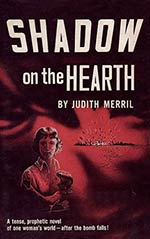 By the way, Nova, as well as Babel-17 and Dhalgren have been recently produced for audio, and are available at Audible.com. I waited over a decade for Delany to come to audio, and the wait was well worth it, because hearing Delany read by a professional makes his rich narrative come alive in myriads of ways my own inner voice fails to find. I beg the audiobook producer gods to please come out with Distant Stars and Aye, and Gomorrah: And Other Stories next. They contain the short novel and novella, Empire Star and “The Star Pit” which are my absolute favorite science fiction stories form the 1960s.
By the way, Nova, as well as Babel-17 and Dhalgren have been recently produced for audio, and are available at Audible.com. I waited over a decade for Delany to come to audio, and the wait was well worth it, because hearing Delany read by a professional makes his rich narrative come alive in myriads of ways my own inner voice fails to find. I beg the audiobook producer gods to please come out with Distant Stars and Aye, and Gomorrah: And Other Stories next. They contain the short novel and novella, Empire Star and “The Star Pit” which are my absolute favorite science fiction stories form the 1960s.
If you’re the kind of science fiction fan I am, old and looking backwards, analyzing a lifetime of reading, The Merril Theory of Lit’ry Criticism is a book you won’t want to miss. The ebook is a real convenience, letting us read a few reviews on our phones whenever a free moment pops up.
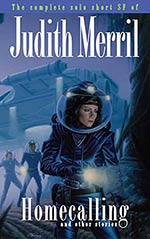 Judith Merril also wrote science fiction, not much, but enough to make her one of the pioneer women writers of science fiction starting in 1948 with her classic short story, “That Only a Mother” appearing in Astounding. She wrote two novels on her own, Shadow on the Hearth (1950) and The Tomorrow People (1960), and two novels with C. M. Kornbluth as Cyril Judd, Gunner Cade (1952) and Outpost Mars (1952). Shadow on the Hearth and the two Cyril Judd novels have been collected by NESFA Press as Space Out: Three Novels of Tomorrow by Judith Merril and C. M. Kornbluth. The Tomorrow People is currently in print from Armchair Fiction, a company that reprints a great deal of forgotten science fiction.
Judith Merril also wrote science fiction, not much, but enough to make her one of the pioneer women writers of science fiction starting in 1948 with her classic short story, “That Only a Mother” appearing in Astounding. She wrote two novels on her own, Shadow on the Hearth (1950) and The Tomorrow People (1960), and two novels with C. M. Kornbluth as Cyril Judd, Gunner Cade (1952) and Outpost Mars (1952). Shadow on the Hearth and the two Cyril Judd novels have been collected by NESFA Press as Space Out: Three Novels of Tomorrow by Judith Merril and C. M. Kornbluth. The Tomorrow People is currently in print from Armchair Fiction, a company that reprints a great deal of forgotten science fiction.
Merril produced several short story collections: Out of Bounds (1960), Daughters of Earth (1968), and Survival Ship and Other Stories (1974), each of which has been repackaged a number of times, but all her stories are currently available as Homecalling and Other Stories: The Compete Solo Short SF of Judith Merril (2005), again from NESFA Press.
I hope both the NESFA books come to audio.
Clifford Simak Doubts His Religion
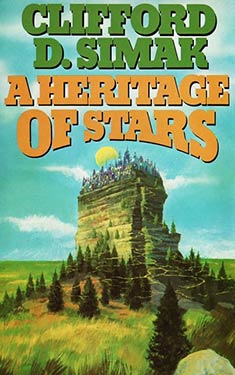 Clifford D. Simak became the third SFWA Grand Master in 1977, but few contemporary SF fans know his work today. A Heritage of Stars is one of his later books, one so obscure that Wikipedia doesn’t even have an entry for this 1977 novel. Simak was born in 1904, and died in 1988, so A Heritage of Stars was written in his mid-seventies, towards the end of his career. I think that’s significant because the book feels like a summation of Simak’s thoughts on science fiction. I know the older I get, the more I want to make sense of a lifetime of reading science fiction.
Clifford D. Simak became the third SFWA Grand Master in 1977, but few contemporary SF fans know his work today. A Heritage of Stars is one of his later books, one so obscure that Wikipedia doesn’t even have an entry for this 1977 novel. Simak was born in 1904, and died in 1988, so A Heritage of Stars was written in his mid-seventies, towards the end of his career. I think that’s significant because the book feels like a summation of Simak’s thoughts on science fiction. I know the older I get, the more I want to make sense of a lifetime of reading science fiction.
We’ve been reading A Heritage of Stars in my book club this month, and the consensus was it’s ho-hum. However, this is my second reading, and the story has improved — significantly. Simak cranked out sixteen novels in the last two decades of his life. Most of them have no entries on Wikipedia. Simak is famous for City (1952) and Way Station (1963), with his first story published in a 1931 issue of Wonder Stories. He wrote science fiction for six decades!
When you consider Simak’s unique perspective, A Heritage of Stars, takes on new meaning. It’s still just an average SF novel cranked out by a prolific writer, but I think it has something insightful to say about the genre we all love. I met Simak at a convention around this time, and I was shocked by how this Grand Master was ignored by young fans. Star Wars had just come out, and new fans were streaming into fandom. At the con they flocked to guests from media related science fiction, not old writers. Simak even looked from the past.
Writers of Simak’s era wrote science fiction as a gospel preaching promises of wondrous futures. Today, science fiction has become something different. Stories are often like fantasy, good storytelling and entertainment, with a bit of pop culture wisdom. Modern science fiction appears to inhabit the dreams of science fiction past. Something happened to science fiction when we stopped going to the Moon in 1972, and then spent over forty years just circling the Earth. NASA in the 1960s, with Projects Mercury, Gemini, and Apollo felt like it had grown out of 1950s Astounding Stories. Reading science fiction in the 1960s convinced fans we’d get to Mars in the 1970s, and the rest of the solar system by the 1990s. The 21st century would be beyond amazing. Here it’s 2016, and we’re still just jawboning about going to Mars. What happened?
Science fiction came of age with Simak in the 1950s, and peers like Heinlein, Asimov, Norton, Williamson, and Clarke. 1950s science fiction asked a lot of questions and generated its own theology. Science fiction’s true believers knew humans would go to the stars, build intelligent robots and evolve psychic powers. That’s the heaven 1950s science fiction promised, the collapse of civilization was its hell and brimstone.
A Heritage of Stars is Simak’s reevaluation of that theology. This is not a book review, so I’m going to give spoilers. If you don’t want to know them, read no further.
One thing that came through loud and clear in this novel is the legacy of L. Frank Baum and his Oz books. I read the fourteen canonical Oz books when I was a child in the early 1960s. Writers like Simak and Heinlein read them in the 1910s. Oz books became a tradition, published in time for Christmas. The original series ran from 1900-1920. Shelves of dissertations could be written on the impact of Oz books on science fiction writers. But there’s something else to note. Around the time the country was banning DC Comics, librarians decided not to carry Oz books because they claimed those books inspired unrealistic expectations in children. Couldn’t we say that about science fiction too?
Can Science Fiction Save Us?
This essay was originally written for SF Signal but was rejected because it discusses religion and politics. I published it on my blog Auxiliary Memory but it got little notice. I thought Worlds Without End readers might be the proper audience. I’m afraid it still references religion and politics, but I’ve rewritten it to be more respectful.
Science fiction has always used world-wide worries to inspire story ideas, and since we have more problems than ever, no science fiction writer should have writer’s block. Science fiction about climate change is a growing sub-genre, and our lists of future-shaking events keeps growing. Any current concern in the news can be extrapolated into the future, becoming a muse for science fiction. But how effective is fiction at solving real world problems? Can science fiction save us?
When I was growing up the future was so bright we had to wear mirror shades. Now, our tomorrows are clouded over by menacing speculative storms. Most of the 7.3 billion passengers on spaceship Earth are so preoccupied with their day-to-day survival that any thoughts about the future are reserved for escapes into imaginary wonderlands. And I can dig that too — who desires realism when its dreary? Anyone who has seen Sullivan’s Travels, a Preston Sturges film about The Great Depression misery, knows that people don’t want stories with messages, but stories that let you forget your problems. I assume Lois McMaster Bujold has more fans than Paolo Bacigalupi.
Science fiction has always taken two paths. The first, and most common, is to entertain. The second, and harder to travel, is to philosophize about the discoveries of science and imagine what they mean to the future. Science fiction has always produced wild speculations, but for most of its history, was never taken seriously. SF was often ridiculed, even though it can be considered a cognitive tool for a highly specific task. Serious science fiction can warn us about emerging dangers through extrapolation, but it also has the potential to create desired goals with creative speculation.
Yet, I’ve got to wonder if science fiction can save us. When I was growing up you’d hide your Heinlein inside a copy of Lady Chatterley’s Lover to avoid the embarrassment of being caught reading science fiction. Science fiction was childish fantasies for weirdo kids. Trufans rationalized science fiction was serious stuff, claiming it prepared readers for the future, but that was mostly laughed at. Things changed May 25, 1977 when Star Wars came out, and science fiction became the favorite form of fairy tale for the information age. Now, billions say they love Sci-Fi, but few take it seriously. Should they?
The future is shaping up to be everything we never wanted. Maybe it’s time to reconsider science fiction’s role. Christians believe that studying the teachings of Jesus can save people, at least after they die. I’d like to believe studying science fiction could save our species before we reach self-extinction. I’m not asking that science fiction become boring and pedantic. I’m just wondering if it’s possible for science fiction to imagine desirable futures that are sustainable. Project Hieroglyph was one attempt.
Novels like Among Others by Jo Walton and All the Birds in the Sky by Charlie Jane Anders convey how painful it used to be growing up nerdy. SF fans were outcasts. In my day they’d call us zeroes. But now that the geeks have inherited the Earth, science fiction fans seem to have taken over the world. Is it’s appeal large enough to be influential? Science fiction must compete with two older literary traditions, The Bible and The Quran, for explaining reality. Science offers the only consistent explanation of reality, but evidently the majority of folks on this planet can’t comprehend it. Science fiction is only slightly more rigorous than religion, but it might be a step in the right direction since religion desperately seeks to focus on the past.
Just because pop culture has embraced comics and science fiction, doesn’t mean they have social impact. Can any novel change society? Maybe. Consider George Orwell’s Nineteen Eighty-Four. That tale of Big Brother and newspeak did more to undermine communism than all the John Birchers put together. Uncle Tom’s Cabin by Harriet Beecher Stowe shamed a nation against slavery, so we know novels can help reshape morality. How many Victorian minds were blown by H. G. Wells? And didn’t Catch-22, M*A*S*H and Slaughterhouse-Five convince many Americans to turn against the Vietnam War?
Every day the mass media brings us more stories about how the future is going to bring humanity retribution for its evil ways. Political conservatives and faithful fundamentalists from around the globe have dedicated themselves to denying science. If billions refuse to listen to scientists, why should they pay attention to science fiction? Christianity uses Hell as an effective tool to sell salvation, so why don’t frightening futures work for science fiction? Of course Christianity has made the purchase price of salvation so ridiculously cheap that most people figure why not buy. Saying “I believe” is a micro-payment compared to the painful expense of self-disciplining our souls. This isn’t an atheist’s jab at religion, but lessons I learned from reading The Cost of Discipleship by Dietrich Bonhoeffer. Anyone who has studied The Bible knows how the prophets plead for their followers to take their warnings serious. History shows few people heeded the prophets, so I tend to think few now will pay attention to science fiction.
Where the rubber hits the road to tomorrowland is the fact that we all need to change the way we live. Most people can’t lose weight even when the incentive is not to die a miserable death. As a species we’re very adaptable at surviving in diverse environments, but we can’t adapt ourselves to stabilize the environment. In 1968, I read Stand On Zanzibar by John Brunner. I was horrified by his vision of 2010. Brunner claimed two common themes would exist, worldwide terrorism, as well as daily TV news stories about crazed individuals committing mass killings. I really didn’t want to grow up to live in that future. But we all have. Could we have studied Brunner in the sixties to avoid the now in which we live? Brunner didn’t offer any prophecy. By the way, prophecy isn’t about predicting the future, but about convincing people how to live, so as to create a desired future. Read The Prophets by Abraham J. Heschel to see what I mean. Can any science fiction novel be truly prophetic? Science fiction can create elaborate extrapolations leading to scary tomorrows, but can it find paths to greener pastures? The prophets of history tried to convince folks to build a better future, and I think that’s what some science fiction writers want to do too.
How often has the fate of the Earth been the plot driver of science fiction? 99% of the purpose of science fiction is entertainment, and even that 1% of serious speculation needs to be entertaining secondarily. Some science fiction writers have been prophets. Unfortunately I have to say this again, as people who read The Bible know, few people listen to prophets, which probably answers my title question.
I bring up this question now after reading All the Birds in the Sky by Charlie Jane Anders, the first SF/F book I read for 2016. Anders’ book is getting great reviews and buzz around the net. It’s a wonderful YA/SF/F/Literary mashup about many things, including the forces of magic and the forces of science separately fighting climate change. Not to give anything away, but I found their desperate solutions rather horrifying, which I think was Anders intention, but other recent science fiction stories have also come up with similar solutions that are even scarier.
The most extreme example is Interstellar, which preaches sacrificing all to build spaceships to seed other worlds before Earth collapses. Their logic is we’ve used up Earth, so let’s abandon it and go find a new home. There was never any suggestion that we try to save our planet. It’s the ultimate example of disposable consumerism. Our home world is a used Kleenex, so toss it out and get a new one.
In Seveneves, the latest novel by Neal Stephenson, the Earth is destroyed by an astronomical event, but humans were given enough time to build a fleet of Noah’s arks in space. This avoids the ethical issue of self-destruction. The story is extremely optimistic about our technological potential. But one of the common reasons now given to justify the colonization of other worlds is that we need to get all our genetic eggs out of one basket. Even scientists like Stephen Hawking are promoting this idea. And it’s logical. We could claim that science fiction inspired this philosophy. If we ever spend the money to colonize the Moon or Mars, we can give science fiction the credit. However, humans haven’t left Low-Earth orbit for over forty years, even after an explosion of science fiction popularity since the last man walked on the Moon. Taking care of Earth should be our prime priority — but it seldom is in science fiction. When will everyone realize that Earth might be our only home for millions of years?
We’re starting to see more science fiction deal with climate change. One very vivid novel last year, The Water Knife by Paolo Bacigalupi, focused on water wars. Bacigalupi doesn’t offer any instructions on how to avoid that future, but does paint such a horrifying picture of climate change’s side-effects that he’s trying to scare us straight. The novel got some good reviews, but I’ve yet to meet anyone else who’s read it and haven’t heard any buzz about it on the net.
Is preaching fire and brimstone futures the only tool science fiction has to convince us to avoid our life of sin? And let’s fess up here, climate change, mass extinction, polluted land, sea and sky, economic inequality, sexism, racism, xenophobia, and all the rest, are our sins. Yes, the world sometimes ends in a comet collision, gamma-ray burst or super-volcano eruption, but most of the time, Earth gets trashed by us.
There’s a growing library of climate change science fiction (Cli-Fi). But will reading such stories make us consume fewer resources? How many people read science fiction? Well, not that many. But multitudes go to the movies to see science fiction. What if HBO offered a mini-series based on The Windup Girl by Paolo Bacigalupi? Would it influence politics and lifestyle? The Windup Girl illustrates the results of climate change, monoculture farming, and using up all the oil. Even though it’s a very colorful future, it’s not one that most people would visit if they had a time machine.
All the governments around the world are working on reducing C02 in the atmosphere. Ninety-eight percent of the scientists and a large percentage of the general population know about the dangers of increased C02. The problem is many people refuse to believe there is a problem, including the Republican Party. Would more science fiction illustrating what life might be like after “visiting the iniquity of the fathers on the children and the children’s children, to the third and the fourth generation” make a difference? If all of us believed the science of climate change absolutely, would we change the way we live? Or are too many Homo sapiens fatalists?
1998 brought two films, Deep Impact and Armageddon about big rocks crashing into our planet. Since then, governments around the world have been spending money to develop early warning systems. And can’t we claim all the SF stories about malevolent emerging AI made the current client of skepticism of artificial intelligence what it is today? Hasn’t the phrase “living off the grid” come from SF-awareness? Haven’t all the Preppers gotten their philosophy from science fiction? Didn’t we go to the Moon because of science fiction? Cold war politics paid for the Apollo program, but wasn’t science fiction the original inspiration?
Science fiction can give us thousands of scenarios about ecological catastrophes, mass extinction events, and AIs transforming society, but are they useful? Do we all just read the stories to be thrilled, and then continue on with our excessive lifestyles, ignoring daily species extinctions, and even wanting our computers to get smarter and take over more jobs?
I have to be cynical here. Could science fiction be like religion, in that we’re willing to talk the talk, but not walk the walk? How many of the faithful swear absolute belief, yet make no attempt to live divinely? How many eco-evangelists live green lives? For the prophets of science fiction to succeed they must first imagine livable lifestyles, and then convince readers to live them. And isn’t the record for famous Biblical prophets something like Prophets 0, People 17? I don’t think we escape our fate by self-flagellation and choosing to live like ascetics. We need visionaries who can imagine new kinds of urban lifestyles that protect the environment yet offer self-sustaining forms of abundances to seek, rather than our rampant destructive consumerism we chase now.
Science fiction has always excelled at imagining Hells, but it’s awful at inventing Heavens. In fact, dystopias are what kids love today. Why? Isn’t it kind of sick that the chosen setting for escapist literature is a dystopia? Why have utopias gone out of fashion? Sure utopias are impossible almost by definition, but getting close might be possible. Utopias were popular hundreds of years ago, but I guess most of humanity gave up on Heaven on Earth back in the 19th century.
Donald Trump campaigns with the slogan “Make America Great Again” so we know a better future is a popular want because of his success. Yet, Republicans are so adamant about no new taxes that they are causing the country to slide into ruin and disrepair. You can’t make a great nation by penny pinching. All the anti-tax revolutionaries have done is ruined K-12 and higher education, neglected the infrastructure, deflated the middle class, fired first responders, teachers and other valuable governmental employees, gutted libraries, let parks run down, defund science and research, and the list goes on and on. America was great when we had the Apollo Moon program, or when we were fighting WWII—and we all paid a lot more in taxes. We weren’t cheap, and knew building a great nation costs money and requires sacrifice.
We have the scientific knowledge and technology to solve all our problems, but we don’t. Why? Because we’re not unified. All across the globe populations are divided between conservatives and liberals. Most of the Muslim world, and half the Christian, want to return to the past, to embrace an Old Testament view of reality. We all live in the same reality, but we each perceive it differently. Until we reach some kind of consensus about the nature of reality, we’re not going to solve our problems. This is where pop culture comes into play, it’s a kind of peer pressure of ideas.
At some point we have to do what the prophets ask, or face extinction. Did all the prophets of the past fail because they imagined unappealing lifestyles? Evidently convincing people to do what’s hard never succeeds over people choosing to do what they feel like. Can science fiction ever make us disciplined?
I didn’t write the above to make a political point, but to show that we lack vision for making life better. Most conservatives are arming themselves for the Armageddon, while liberals focus on their own brand of gloom and doom. Science fiction needs to stop thinking about the end of the world and focus on the goal of surviving a million years on this planet. If we don’t think about the future, then the future becomes whatever we’re doing without thinking.
JWH
Forward To The Past: The History of Science Fiction
In an essay I recently wrote for BookRiot, “The Genesis of Science Fiction,” I wondered just how old is science fiction? Many SF historians say Frankenstein by Mary Shelley is the first SF novel, while others dredge up stories as far back as classical Greece and Rome. I speculate science fiction began in prehistory, and look to The Book of Genesis for clues before we wrote things down.
Of course, what I wrote was wild speculation. Brian Stableford, in his new four volume science fiction history, New Atlantis: A Narrative History of Scientific Romance, carefully documents how science fiction was well entrenched in the 19th and early 20th century, way before it got the name science fiction. Back then, it was sometimes called Scientific Romance. Stableford’s four volumes are subtitled:
- The Origins of Scientific Romance
- The Emergence of Scientific Romance
- The Resurgence of Scientific Romance
- The Decadence of Scientific Romance
These books are not for casual science fiction fans, but for readers who love science fiction so much they want to know its deep history. Michael Dirda reviews them in more detail in his essay, “Formerly Future: The Lost World of the Scientific Romance.” I’ve always been keen on the history of our genre, and while these books are dry, technical and philosophical, I find them enlightening. Probably most readers feel science fiction is a modern invention, that emerged with atomic bombs, space travel and computers in the 1950s. You rarely see any mention of science fiction in popular culture before 1950, and our genre didn’t reach universal fame until 2001: A Space Odyssey and Apollo 11 in the late 1960s.
We think of science fiction being based on science. We want to believe that science fiction is different from fantasy, because we believe concepts imagined in science fiction are possible, while the creations of fantasy are not. But when you study the history of fiction, and the history of our species, you realize the psychology of our desires are revealed in both genres. One example is when Stableford discusses fantasy portals. Fantasy novels need a fictional gimmick to get regular people into a fantasy-land. For example, C. S. Lewis uses a wardrobe as a portal to Narnia. Star Trek has the transporter and Hyperion Cantos has the farcaster. Science fiction readers want to believe such machines are possible in the future. But is that realistic? Aren’t they really fantasy portals for science fictional fantasies? Stableford’s books go into that kind of analysis.
According to Stableford, 19th century writers, especially British and European, used science fiction to explore philosophical issues. He suggests Americans were the ones that got the idea of actually inventing all the fictional devices that the Europeans thought of as mere tricks to get their characters into the future or to other words. H. G. Wells didn’t believe in time machines, but he did believe in evolution, cosmology and geology, and he wanted to speculate what that knowledge implied.
I recommend New Atlantis for fans who want to be scholars of our genre. For average fans who just want a great overview of our classics, I recommend How Great Science Fiction Works by Gary K. Wolfe, a Great Course from the Teaching Company. It can be had cheaply at Audible.com for one credit. I describe the course and the books it covers in an essay at SF Signal.
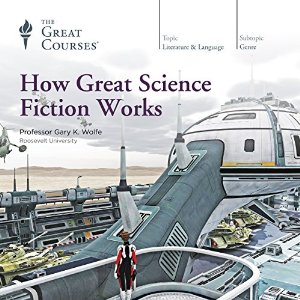 When I read old Radium Age science fiction like Goslings (1913) by J. D. Beresford and Herland (1915) by Charlotte Perkins Gilman, I feel those writers are focused on philosophical speculation, and not thrilling adventures. Which makes me wonder if science fiction has lost its way. Science fiction branched with Jules Verne and H. G. Wells. Americans, and now the world, has followed the path of Verne. Few follow the path of Wells.
When I read old Radium Age science fiction like Goslings (1913) by J. D. Beresford and Herland (1915) by Charlotte Perkins Gilman, I feel those writers are focused on philosophical speculation, and not thrilling adventures. Which makes me wonder if science fiction has lost its way. Science fiction branched with Jules Verne and H. G. Wells. Americans, and now the world, has followed the path of Verne. Few follow the path of Wells.
There is value in reading old science fiction. It can be a kind of self-analysis, revealing our deeper motives. Science fiction has always sold two products — wonders and warnings — about the future. If you embrace one product exclusively, you’ll be psychologically damaged. For too many readers, science fiction has become sense-of-wonder crack. Science fiction is now a money-making commodity, and lost is edge. Returning to the 19th century, and reviewing how science fiction evolved shows science fiction once had a different purpose. However, even the Victorian Age has been corrupted by modern science fiction into a Disneyland of bustles and steampunk gadgets.
I’m currently listening to Too Like the Lightning by Ada Palmer. Palmer is a Professor of History at the University of Chicago, with a PhD from Harvard. Her novel uses the past and philosophy like H. G. Wells to speculate about the future. I’m thrilled by its ideas and speculation, but I wonder if it will be thrilling enough for readers who took the path of Jules Verne?



















 Full Details
Full Details

